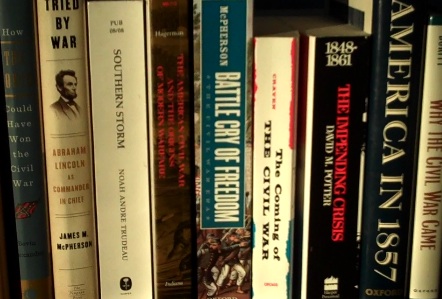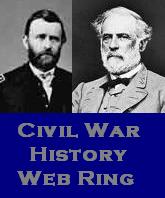The Civil War as Revolution – Part I
[Note: This post is part of a series on The Civil War as Revolution which is available at the following links: Part I, Part II, Part III, Part IV, Part V, The Revolutionaries of the American Civil War, and Cogitating on Abraham Lincoln as Revolutionary.]
————-
Earlier this month, I posted some thoughts on Abraham Lincoln as revolutionary. It ties to one of the topics we were asked to consider this term, whether the Civil War should be considered the second American revolution. I suspect it is an essay question in many American history programs dealing with the Civil War. I’d like to explore this over the next several posts. A proper place to start is with the question, what is revolution?
![Fist [Source Wikopedia Commons]](https://i0.wp.com/upload.wikimedia.org/wikipedia/commons/thumb/1/17/Fist.png/421px-Fist.png) According to William A. Pelz in his study on the history of German social democracy, “revolution” comes from the German word “Ugmwälzung” which means “rotation,” as in the turning of an axle. He posits that “in the socio-political realm, revolution means the displacement of a state, governmental, social and economic system by another, higher, more developed state, governmental, social and economic system… Two things are essential to the concept of revolution: that the rotation (Ugmwälzung) be comprehensive and fundamental–that everything old and antiquated be thrown out, weeds torn out by their roots; that a higher and better state replace that which has been done away with. Both conditions must be maintained.”[i] Thus social revolution results in nothing less than transformation.
According to William A. Pelz in his study on the history of German social democracy, “revolution” comes from the German word “Ugmwälzung” which means “rotation,” as in the turning of an axle. He posits that “in the socio-political realm, revolution means the displacement of a state, governmental, social and economic system by another, higher, more developed state, governmental, social and economic system… Two things are essential to the concept of revolution: that the rotation (Ugmwälzung) be comprehensive and fundamental–that everything old and antiquated be thrown out, weeds torn out by their roots; that a higher and better state replace that which has been done away with. Both conditions must be maintained.”[i] Thus social revolution results in nothing less than transformation.

- Painting by Eugene De la Croix (Charenton-Saint-Maurice, 1798 – Paris, 1863) July 29, Liberty guiding the people. Musée du Louvre. Public Domain
Pelz offers two examples of undisputable social revolution. The first, not surprisingly, is the French Revolution, “…the revolution par excellence…that swept away the last remains of medieval feudalism and created the foundation of modern bourgeois society.”[ii] The second example – though hardly resembling the first – was none the less more profound. It was triggered by “the introduction of machine work, which fundamentally altered the nature of work and thereby the basis of state and social life. Every sphere of human existence was penetrated by this revolution (Umwälzung). These two organically related revolutions (Umwälzungen) born of the same impetus, only manifesting themselves differently, are probably the most important revolutions known to history. They toppled and purged from top to bottom and brought humanity forward with a violent jolt.”[iii]
Revolution in politics has been described as “fundamental, rapid, and often irreversible change in the established order.”[iv]
- Da Vinci
Revolution involves a radical change in government, usually accomplished through violence[,] that may also result in changes to the economic system, social structure, and cultural values. The ancient Greeks viewed revolution as the undesirable result of societal breakdown; a strong value system, firmly adhered to, was thought to protect against it. During the Middle Ages, much attention was given to finding means of combating revolution and stifling societal change. With the advent of Renaissance humanism, there arose the belief that radical changes of government are sometimes necessary and good, and the idea of revolution took on more positive connotations. John Milton regarded it as a means of achieving freedom, Immanuel Kant believed it was a force for the advancement of mankind, and G.W.F. Hegel held it to be the fulfillment of human destiny. Hegel’s philosophy in turn influenced Karl Marx.[v]
Historian James McPherson offers the following as a “common sense” definition for revolution: “an overthrow of the existing social and political order by internal violence.”[vi] With this as background the question becomes, does the American Civil War qualify for revolution status? Was it sufficiently transforming?
- Mark Twain
More in tomorrow’s post but let me leave you with this quote from Mark Twain.
No people in the world ever did achieve their freedom by goody-goody talk and moral suasion: it being immutable law that all revolutions that will succeed must begin in blood, whatever may answer afterward.
– A Connecticut Yankee in King Arthur’s Court
Copyright © 2007 Rene Tyree
[Addendum: This series on The Civil War as Revolution continues at the following links: , Part II, , Part III,, Part IV, Part V, The Revolutionaries of the American Civil War, and Cogitating on Abraham Lincoln as Revolutionary.]
[i] Pelz, William A. and William A. Pelz, eds. Wilhelm Liebknecht and German Social Democracy: A Documentary History. (Westport, CT: Greenwood Press, 1994), 264-265, Book on-line. Available from Questia, http://www.questia.com/PM.qst?a=o&d=15096547. Internet. Accessed 13.October 2007.
[ii] Ibid., 265.
[iii] Ibid.
[iv] Encyclopedia Britannica. Chicago: Encyclopedia Britannica, 2007
[v] Ibid.
[vi] James M. McPherson, Abraham Lincoln and the Second American Revolution, (New York: Oxford University Press, 1991), 16.

















































Leave a comment